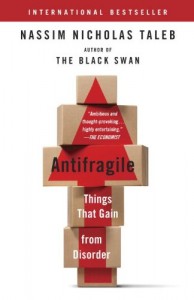I’m moved to return to this blog series on Critical Thinking by the appearance of a particular fallacious argument in current political discourse in the UK (in the form of the “best of three” argument about a possible second referendum on Brexit). This is an example of the slippery slope fallacy, which I’ve not yet covered in this series. This fallacy doesn’t seem to be as widely understood as it should be. I regularly see people online using “slippery slope” as though it was a justification rather than a fallacy, and even highly-educated BBC journalists seem either unaware of it, or otherwise unwilling to challenge politicians who use it.
The slippery slope fallacy, like any other bias or fallacy, involves an absolutized assumption that is usually unrecognised. In a Middle Way analysis there is always a negative counterpart to an absolutized assumption (assuming the opposite) and that’s also the case here. In the case of a slippery slope fallacy, it involves an assumption that if one acts in a particular way showing a tendency in a particular direction, this will necessarily result in negative effects that include further movement in the same direction, with further negative effects. The absolutisation here lies in the “necessarily”. Those who think in this way do not consult evidence about what is actually likely to happen following that course of action, or justify their position on the basis of such evidence. Rather, they just apply a general abstract principle about what they think must always happen in such cases. Such general abstract principles are usually motivated by dogmatic ideology of some kind.
Some classic examples of the slippery slope fallacy involve arguments against voluntary euthanasia or the legalisation of recreational cannabis. The argument against legalising voluntary euthanasia goes along the lines of “If you allow voluntary euthanasia, then there’s bound to be a creeping moral acceptance of killing. Respect for human life will be undermined. Before you know it we’ll be exterminating the disabled like the Nazis did.” The argument against legalising recreational cannabis would follow the lines of “If you let people smoke cannabis, they’ll soon be on to harder stuff. It’s a gateway drug. We’ll soon have the streets full of heroin addicts.” In both of these arguments, there is no particular interest in whether there is any evidence that the lesser effect would in fact lead onto the greater one, just the imposition of a dogmatically-held principle that proclaims what would always happen. The absurdity of assuming that this is what would always happen becomes clearer if you think about how easily we could use these slippery slope arguments against currently accepted practices: “If you allow euthanasia for dogs, you undermine respect for life and before you know it, it will be applied to humans.” or “If you allow people to smoke tobacco, they’ll soon be smoking heroin. It’s a gateway drug.” In practice, we draw boundaries all the time, and in law we enforce them. There is no particular obvious reason why new boundaries should be harder to enforce than previously accepted ones.
So now we come to the current use of the slippery slope fallacies in UK political discourse. This is by Brexiteers opposed to the idea of a second referendum – which, at the time of writing, is looking increasingly like the only viable option to release the UK parliament from deadlock over Brexit. There argument goes along the lines of “If we have a second referendum, what’s to stop us having a third one or a fourth one? We’ll never resolve the issue.” Here’s one example of many uses of this argument in the media. As in the euthanasia and drug legalisation arguments, the objection appears to simply involve the dogmatic application of an implicit principle, in this case, that “politicians can call as many referendums as they like until they get the result they desire”. As in those arguments, also, there is no positive evidence that this would actually be the effect, nor that this is actually part of anyone’s motives. In practice, it seems much more likely that the amount of public resistance would grow the more referendums were called. In its imposition of an abstract dogmatic principle on the situation, this argument completely misses the point that the call for a second referendum is a pragmatic response to a particular situation of deadlock, not an invocation of a general political principle.
As with other biases and fallacies, there is also a negative counterpart to the positive slippery slope fallacy. This is the failure to acknowledge actual evidence that a “slippery slope” might happen, due to an absolute reaction against the slippery slope fallacy. There are some instances where there is positive evidence that a particular course of action can initiate a gradual deterioration – for instance, being unemployed is often correlated with poverty and depression. Not that everyone who is unemployed will necessarily suffer in these ways, but that your chances of becoming poor and depressed demonstrably increase once you are unemployed. The danger of further negative effects from unemployment is probably something you should take into account before you resign from your job, if you have no alternative available: but taking it into account does not necessarily mean that it should determine your response.
So, the slippery slope fallacy is just another common instance of dogmatic assumptions applied in unconscious everyday thinking. It doesn’t imply that there are no “slippery slopes”, only that you need to look carefully at the slopes before you set off down them to see how slippery they really are. You might well be able to keep your footing better than you expect.
Link to index of other blogs in the Critical Thinking series
Picture: ‘Slippery Slope’ by S. Rae (Wikimedia Commons) CCSA 2.0






